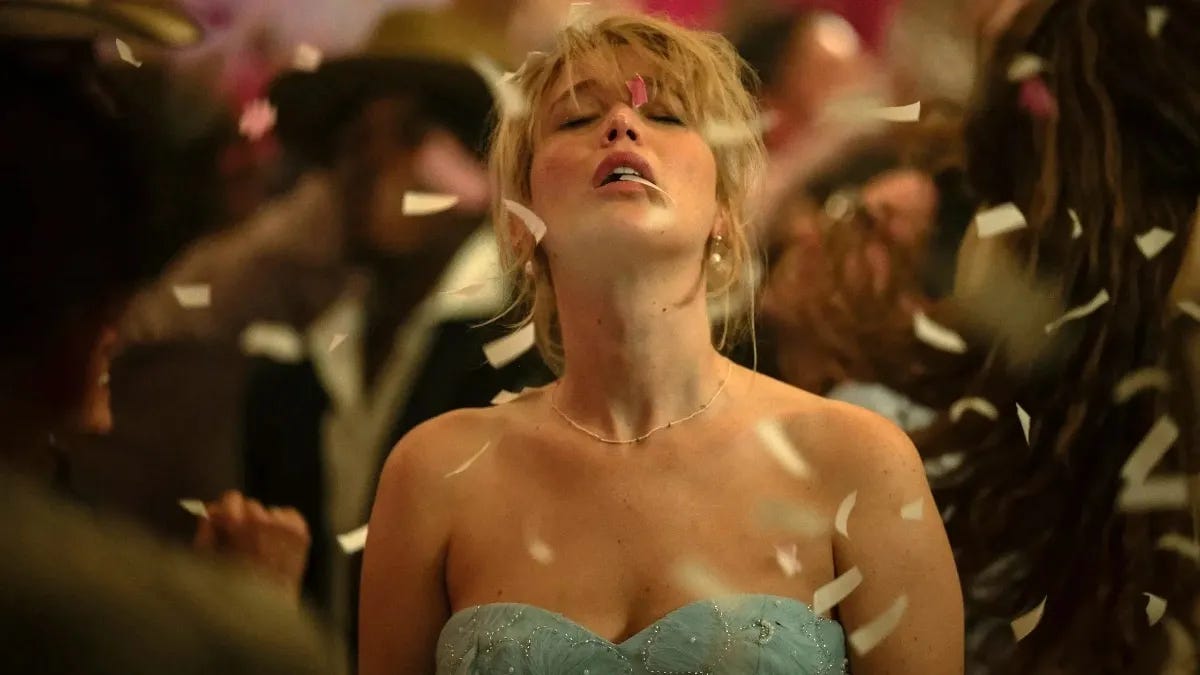Jennifer Lawrence going “full feral” in postpartum movie Die, My Love will resonate with many mothers
The early days of motherhood are too 'alien' to fit in with how women are expected to behave after birth.
It’s reassuring to know that Jennifer Lawrence has felt like an alien.
Speaking at a press conference this week for her new film Die, My Love, which is the story of a mother unraveling into postpartum psychosis, Lawrence gave a glimpse into her own experience of having children.
“There’s not really anything like postpartum,” she told the media. “It’s extremely isolating.” Her character in the film moves to a remote location, but Lawrence stressed that the rural setting only plays a small part in what happens: “The truth is, extreme anxiety and extreme depression is isolating, no matter where you are. You feel like an alien.”
Those comments hit harder when you consider the timeline of Lawrence's own pregnancies.
She read the book that Die, My Love is based on straight after her first child was born, and then pushed to make it into a film with director Lynne Ramsay until Ramsay finally agreed. She was several months pregnant with her second child while shooting the movie, and said her hormones were “the only way I would be able to dip into some of this visceral emotion.” Her second child was born in March this year, meaning she is now promoting the film while barely out of the postpartum period herself.
Lawrence didn’t make clear whether she experienced postnatal depression (that’s the UK term, it’s called postpartum depression in the US). But she spoke about a blurring between herself and her character, Grace.
And I wondered, quietly, how dark things had gotten for her. Hopefully not as dark as the film. “You haven’t lived” until you’ve seen Lawrence going “full feral” in the movie, one reviewer wrote.
Not many of us who have had children have spent time crawling through a field towards their baby, clutching a kitchen knife, as Lawrence’s character does in Die, My Love. But those like me, who have experienced postnatal depression, know that even if you didn’t have rare symptoms like psychosis, you can relate deeply to a woman losing the plot after having a baby.
I had postnatal depression after my second child was born. You do feel like an alien: it’s surreal and it’s othering and it’s desperate, truly desperate. You repulse yourself and you are so confused: because feeling such wildness, such dissatisfaction, towards an innocent baby that you are meant to be caring for is one of society’s ultimate taboos.
My baby cried so much. It felt like a constant assault on me, angry, wild and painful. I’d had an “easy” baby the first time, so I knew all the things I thought babies were “meant” to do, and he did none of them. The shock was unreal. I wanted to run, to leave my body, to be anywhere else.
Even on good days, I remember fantasising about walking along a tightrope, knowing that at any second I could slip off it, down into a sinister place below that was always waiting to immerse me. The best way I can describe it is like ‘The Upside Down’ in the show Stranger Things. An alternate dimension that mirrors our world, but where familiar things become grotesque.
The parts of my experience I’ve hardly shared with anyone were the long nights where, rocking my baby vigorously for 45 minutes each time he woke (the only way we had found to get him back to sleep) I developed a habit of singing a horrible, vindictive song to him. I’m grateful I can’t remember the words, but they were certainly “full feral”: voicing the rage and aggression that I wouldn’t have acted upon, but that needed an outlet. If you don’t hold yourself together, you fall apart.
Related articles
Die, My Love is transgressive because postnatal breakdown is something society still believes should be kept secret and not shown publicly. The exact meaning of the word “feral”, that was used to describe Lawrence’s performance is “in a wild state, especially after escape from captivity or domestication”.
I can relate to that: the shame of postnatal depression can be so acute that new mothers can feel like they are in captivity. So seeing someone break free from that, even on screen, and even with devastating consequences, is a kind of liberation. The praise for Lawrence’s uninhibited performance shows how unusual it is to see a woman free from restraint in her reaction to having a child.
Because those early days of motherhood are too horrendously primal, too alien to fit in with how women are “expected” to behave after birth, and the extremities of the experience are still relatively unexplored in culture and science. We’ve only just coined a word - matrescence - for the way motherhood transforms the mind and body far more than we ever thought before.
So I’m grateful for films like Die, My Love - although I likely won’t be watching it. I’m not ready to slip off that tightrope again quite yet, not even four years after my experience. It would be too close to the bone. But perhaps that’s the point.








I haven’t seen the film and to be honest, I’m not really drawn to watch it but I really appreciated this article. Thank you for sharing it. I stopped when I read that this period can feel lonely… and that part touched me deeply. I remember just wanting to be held, to hear someone say “you’re doing fine, everything’s going to be okay”. It really can be such a lonely time. I haven’t experienced the darker sides mentioned, thankfully but that sense of not being understood, I believe so many women feel that. And I just want them to know: it’s okay, we all go through ups and downs.